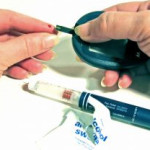 For the most part, you should be able to correct low blood sugar by drinking small amounts of fluid that are highly concentrated in sugar, such as orange juice, followed by nutrition that is high in protein to maintain blood sugar levels. The initial high glucose fluid, such as orange juice with no added sugar, will enter the bloodstream quickly through the stomach lining and the follow-up of protein will give the body a consistent supply of nutrition. (2)
For the most part, you should be able to correct low blood sugar by drinking small amounts of fluid that are highly concentrated in sugar, such as orange juice, followed by nutrition that is high in protein to maintain blood sugar levels. The initial high glucose fluid, such as orange juice with no added sugar, will enter the bloodstream quickly through the stomach lining and the follow-up of protein will give the body a consistent supply of nutrition. (2)
Low blood sugar can also occur at night. Unfortunately it is harder to recognize because individuals are most likely asleep. Diabetics who suffer the effects of low blood sugar at night can experience nightmares, waking up very alert, sweating at night and awakening with damp bed sheets, waking up with a fast heart rate or restlessness and an inability to go back to sleep. (3)
 It is very important for individuals to check their blood sugar during the night if they awaken with any of these symptoms. If you feel certain you are a low then eat a few quick carbohydrates before testing your level in order to ensure that your blood sugar will not continue to drop.
It is very important for individuals to check their blood sugar during the night if they awaken with any of these symptoms. If you feel certain you are a low then eat a few quick carbohydrates before testing your level in order to ensure that your blood sugar will not continue to drop.
Some individuals will sleep through night reactions but have symptoms the next morning. If you awaken in the morning with a very high blood sugar level after breakfast or before lunch, headache first thing in the morning, ketones in the urine but no glucose and/or foggy thinking first thing in the morning, you should wake yourself up during the night at 2 a.m. for the next few nights in order to test blood sugar. This will help to identify and correct the situation that can have potentially damaging results.
Researchers have found that a diabetic who has one insulin reaction increases their risk of having another. In one study researchers found that 22% of people who suffered a hypoglycemia episode which required ambulance attendance suffered another within the next 24 hours. (4) Unfortunately, the longer a person has diabetes and suffers from low blood sugar reaction, the more difficult it is for them to recognize the symptoms of a hypoglycemic attack because the body acclimates to the stress of low blood sugar. These individuals only recognize low blood sugar levels when their sugar drops significantly.
It is very important for individuals who suffer from diabetes to continue to monitor their blood sugar levels even when they believe that they are stable and under control. Blood sugar levels are significantly affected by exercise, stress, lack of sleep and hydration. By a closely monitoring blood sugar an individual is taking big steps towards improving their long-term health.
References:
(1) National Diabetes Information Clearinghouse: Hypoglycemia
http://diabetes.niddk.nih.gov/dm/pubs/hypoglycemia/#treatment
(2) Mayoclinic.com: Hypoglycemia
http://www.mayoclinic.com/health/hypoglycemia/DS00198/DSECTION=treatments-and-drugs
(3) Medscape General Medicine: Nocturnal Hypoglycemia
http://www.ncbi.nlm.nih.gov/pmc/articles/PMC1994862/
(4) Prehospital Emergency Care: Prehospital Hypoglycemia
http://www.ncbi.nlm.nih.gov/pubmed/14582099
| Advertisement | |
|
|



Leave a Reply